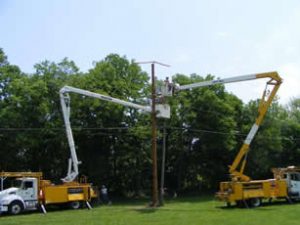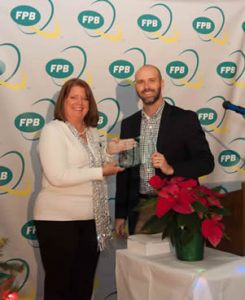The Frankfort Electric and Water Plant Board (FPB) offers water, electric, cable, internet, telephone and security services to Frankfort and several surrounding counties. Not only does FPB face a constantly-changing work environment, but each department confronts different hazards on a daily basis so making sure their employees stay safe on the job is no easy task. Nonetheless, FPB has received the KEMI Destiny Award for 5 consecutive years, a feat that only three other companies achieved in 2015.
With more than 200 employees throughout the organization, the Safety Department at FPB understands the complexities of building an effective safety program. We spoke with Kim Phillips to get a sense of what helps this organization maintain a focus on safety in a hazardous industry.
KEMI: What is your position at the FPB?
Kim: I am the Safety Director. It’s a two-person department and we oversee employee safety, the workers’ compensation program, and I also handle most of the liability claims issues. I’ve been working in the company and in this position for 21 years.
KEMI: From your perspective, has safety always been a top priority in the organization?
Kim: When I started 21 years ago, I was the first Safety Director. Because of the hazardous nature of our business, FPB has always recognized a need to focus on the safety of the employees but many years ago the leaders realized that the demands of the safety program called for someone to oversee the efforts and hired me to lead the way.
Since I’ve been here, there has always been a focus on safety. It’s a priority. We developed multiple safety programs, campaigns, and put systems in place to help manage costs and ensure that we remain compliant and proactive with safety.
 KEMI: What aspects of the safety program do you feel are the most effective?
KEMI: What aspects of the safety program do you feel are the most effective?
Kim: We are in a business where the hazards change daily. We’re much different than, for example, a manufacturing business where environmental hazards predominately remain the same from week to week. Our employees’ environmental hazards change based on what is in a customer’s yard, etc., but we’ve set up an effective system in which each specific department is responsible for its own safety meetings and programs. The Safety Department provides oversight, guidance, research and support for all the departments. We ensure that as a company, we are meeting OSHA standards and managing our workers’ compensation program. Within each department, there is a lot of activity and buy-in from the employee because each line of business we have is so different from one another. Since they are so varied, each department basically needs “safety experts” to suit the needs of their work. The employees have really responded well to that. We have weekly safety meetings in all of our operational departments. That’s an aspect of the program that we’ve been doing for 20-plus years. The Safety Department contributes regularly to these meetings by providing trainings or acting as a “guest speaker.” With the departments organizing and planning these meetings, it encourages employee participation and buy-in and I believe that has contributed to our success as a whole.
KEMI: What are FPB’s biggest safety successes?
Kim: One example of a safety success occurred once we identified an issue in the number of shoulder strains and sprains in our Water Department. We implemented a “Stretch and Flex” program which encouraged employees to start their work day stretching the muscles that are commonly used in the tasks that they perform. This program was a bit outside of our comfort zone and employees were skeptical at first, but they soon realized the benefits of stretching their muscles and as a result we saw a significant decrease in the amount of strains and sprains in that department. I would definitely consider that a success!
I believe our weekly safety meetings are also a success. An individual employee within a department is responsible for preparing a portion of the safety meeting and they have time to gather research on a topic of their choice. This research helps the employee look more deeply into safety issues and they have the freedom to choose something of interest to them. Oftentimes, the employee will cover things that don’t directly apply to the work environment, and that’s okay! For example, an employee did a presentation on deer-stand safety for hunters. Of course we don’t have deer-stands, but we do have many employees that hunt as a hobby. Whether an employee is hurt at work or at home, it will still affect his/her ability to come to work so allowing the employees to cover topics applicable to them in all aspects of life helps the meetings to remain relevant and effective.
KEMI: What are the biggest safety challenges?
Kim: Our line of work presents different hazards every day. Trying to stay on top of this dynamic work environment and maintain focus in the employees is a constant challenge, but we encourage our employees to realize that each day presents something new and potentially dangerous. Most of our employees have been here for several years so it can be easy for those individuals to become desensitized to many of the jobs’ hazards. Our job is to try and help them to remain focused and prepared to react to the changing environments of the work sites.
 KEMI: Have you used KEMI’s safety resources and what can you say about their value to FPB?
KEMI: Have you used KEMI’s safety resources and what can you say about their value to FPB?
Kim: We enjoy our partnership with KEMI. Our employees know KEMI as a company and especially recognize and appreciate Jeff Floyd, the Loss Education & Safety Manager. He has provided in-person OSHA safety courses, excavation training, and works with us to provide additional safety suggestions for our current program. Working with the Claims department has also been very easy and I can manage more effectively because of our relationship. We can call KEMI’s Loss Education department with anything safety-related; I am very grateful for that type of a partnership.
KEMI: What are some exciting things that FPB has coming up soon?
Kim: We are moving into a new administration building so we are working on new procedures and policies that will be in place once we have moved over. Right now, we are focusing on safety procedures by partnering with the local police department and security consultants to develop a top-of-the-line safety program to prevent workplace violence incidents and provide an overall safe working environment.
To learn more about Frankfort Electric and Water Plant Board, visit fpb.cc.

